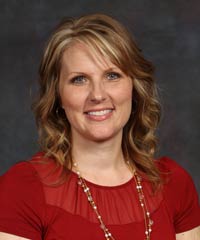Until last fall, the tenure and promotion application process was binder-centric — as in, it depended on physical binders that housed documents related to the applicant’s teaching, research and service. For the fall 2023 cycle, applicants had a new option: submitting via an all-digital system, Faculty Success by Watermark.
Faculty Success

Dr. Letitia White Minnis, associate dean for the McQueary College of Health and Human Services, is leading the team that’s working on the transition to this all-digital process. She says that 28 tenure and promotion applicants — more than 40% of total applicants — submitted through Faculty Success last fall.
“The majority of people were very positive,” Minnis says. “A few people had experiences that weren’t as positive, and they’ve provided good feedback and ideas. Any new process like this is a work-in-progress on both ends — for the people designing the workflow and for the people using it.”
Digital Benefits for Applicants
People reported that they liked not having to print out and manage documents. In the past, these tasks could be overwhelming, especially considering the many years worth of teaching, research and service activities that applicants must document when they apply for tenure and/or promotion. On top of all this printing, documents had to be organized and logically presented within the binder, another task that falls into the “easier said than done” category.
Faculty Success not only helps keep these documents tidy and organized; it also allows you to access them wherever you are — in your office, at home, on sabbatical, at a conference — anywhere you might like to work.
Benefits for Reviewers
People who reviewed applications in Faculty Success reported that the digital system offered another bonus. It presents information in a consistent manner. This means that, instead of having to learn the specifics of each binder’s organization, reviewers read applications within an interface that stays the same.
As Minnis puts it, “Once you figure out how things are laid out within Faculty Success, you know where to look for various documents and information.” In addition to saving time, this provides a layer of assurance. Since reviewers know the system, they can feel confident that they’re finding all the relevant documents.
Providing Feedback
Each college has designated at least one point person to work with Faculty Success. Minnis encourages anyone who has ideas about improving the workflow to reach out to their college point person. “Different people find different tips and tricks as they navigate the system,” she says. “They may read help guides and find information that can help others as well.”
If you have research that’s best understood within a unique context, you might feel concerned about moving away from the binder system, but Minnis says that Faculty Success allows for some customization in the way that a faculty member’s activity is reported. This means that you’re not automatically locked into the structure of the system’s faculty activity report.
“Everybody’s reports are similar, which allows for that consistency piece,” Minnis says. “But the reports can be edited with certain ‘extras’ here and there.” These questions are addressed on a case-by-case basis; reach out to your college point person for more information.
Point People by College
- College of Education: Dr. James Sottile and Dr. Ximena Uribe-Zarain
- College of Business: Dr. Elizabeth Rozell
- College of Natural and Applied Sciences: Gale Lininger
- Reynolds College of Arts, Social Sciences and Humanities: Dr. Jason Jolley and Angela Barker
- Libraries: Rachel Besara and Joshua Lambert
- Darr College of Agriculture: Dr. Kara Wolfe and Dr. Lacy Sukovaty
- McQueary College of Health and Human Services: Dr. Letitia White Minnis
Faculty Success in Upcoming Cycles
If you’re planning to submit for tenure and/or promotion in fall 2024, you have the option of submitting via Faculty Success. Colleges may continue to permit a hybrid approach for the next cycle. For example, you might be asked to upload certain materials, such as your C.V., matrix and cover letter, to Faculty Success but allowed to submit supporting evidence in a physical binder. For specifics about the process in your college, reach out to your point person.
If you’re currently preparing for the external review portion of the tenure/promotion process, please be aware that — for the upcoming tenure/promotion cycle — most colleges do not intend to use Faculty Success for external reviews. Check with your college point person for guidance.
Annual Reviews
Going forward, annual reviews will be facilitated in Faculty Success. Minnis says that this spring, more than 500 reviews were conducted in the system. One big benefit of using Faculty Success for this process is that it makes previous years’ reviews readily accessible. Instead of having to track down hard copies, the reviews are all right there, in the system.
As everyone navigates this new process, Minnis encourages people to keep talking about their experiences. “Your perspective might help others,” she says. “Please share it with your point person.”
Around Campus…

The Darr College of Agriculture recently hosted approximately 2,500 high school students from southwest Missouri for a Future Farmers of America (FFA) qualifying event.
Dr. Jim Hutter, associate professor in the School of Hospitality and Agricultural Leadership, says he’s been involved with this event for more than 40 years. “I participated as a high school student and then brought my students to the event when I was a high school teacher,” he says. “For the last 34 years, I’ve been putting the event together.”
Hutter says it takes many, many hours — from many dedicated faculty and staff — to pull this event off. It’s all worth it. Our district is “arguably one of the most competitive nationwide,” he says, and the event clearly makes a lasting impression.
To get a sense of everything that happened during the FFA competition, check out recap videos from Day 1, Day 2 and Day 3.

